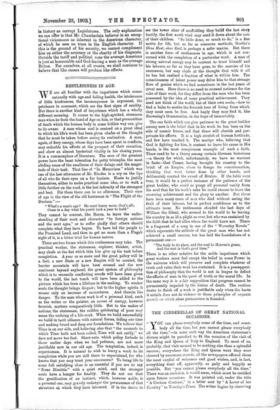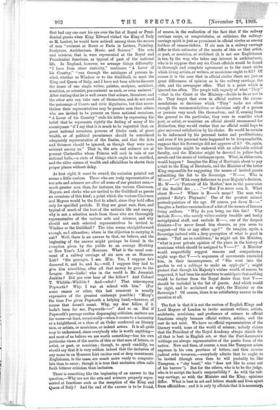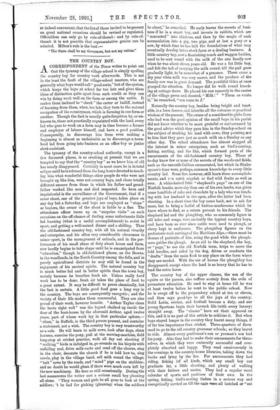THE CINDERELLAS OF GREAT NATIONAL OCCASIONS.
" you can please everybody some of the time, and some- body all the time, but you cannot please everybody all the time,"—in some such way the American statesman's dictum might be parodied to fit the occasion of the visit of, the King and Queen of Italy to England. To most of us, probably, that visit seemed to be nothing else than a splendid success; everywhere the King and Queen went they were cheered by enormous crowds, all the newspapers offered them the most cordial of welcomes and good wishes, and, in fact, everything went off, apparently, as gaily and happily as possible. But "you cannot please everybody all the time." There was an omission, it would seem, which must be rectified upon future occasions. It was pointed out, under the title "A Curious Contrast," in a letter sent by "A Lover of his Country" to Tuesday's Times. The writer begins by observing
that had any one cast his eye over the list of Royal or Presi- dential guests when King Edward visited the King of Italy or M. Lonbet, he would have noticed among them the names of men "eminent at Rome or Paris in Letters, Painting, Sculpture, Architecture, Music, and Science." The arts and sciences, that is, were represented at the Royal and Presidential functions, as typical of part of the national life. In England, however, we arrange things differently. "I have from sheer curiosity," continues "A Lover of his Country," "run through the catalogue of persons in- vited, whether to Windsor or to the Guildhall, to meet the King and Queen of Italy, and I have not been able to discover the name of one single writer, painter, sculptor, architect, musician, or scientist, pre-eminent as such, or even eminent." After stating that he is well aware that science, literature, and the other arts can take care of themselves, and do not need the patronage of Courts and civic dignitaries, but that never- theless their representatives may be greater men than others who are invited to be present on these national occasions, "A Lover of his Country" ends his letter by expressing the belief that he represents rightly the feeling of many of his countrymen "if I say that it is much to be regretted that, on great national occasions, persons of titular rank, of great wealth, or of political prominence should be considered adequately representative of the Realm, and that the Arts and Sciences should be ignored, as though they were non- existent among us." That is, the arts and sciences are at present Cinderellas whom Princes will seek in vain at our national balls,—a state of things which ought to be rectified, and the elder sisters of wealth and officialdom be shown their proper places without delay.
At first sight, it must be owned, the omission pointed out seems a little curious. Those who are truly representative of our arts and sciences are after all some of our greatest men,— much greater men than, for instance, the various Chairmen, Mayors, and clerks who are invited to the Guildhall as guests on occasions of this kind; a point which the various Chairmen and Mayors would be the first to admit, since they hold office only for specified periods. If they are great men, then, and typical of much of the best of the nation's life and energy, why is not a selection made from those who are thoroughly representative of the various arts and sciences, and why should not such selected representatives be invited to Windsor or the Guildhall? The idea seems straightforward enough, and attractive ; where is the objection to carrying it out ? Well, there is an answer to that, we believe, and the beginning of the answer might perhaps be found in the raception given by the public to an average Birthday or New Year's List of Honours. What is the usual com- ment of a railway carriage of six men on an Honours List ? "Six peerages, I see. H'm. Yes, I suppose he's deserved it, and he, and he,—well, I suppose they had to give him something, after all that money he gave to the League. But—bulb! who in the world is Mr. Jeremiah Jenkins ? Did you ever hear of the fellow ? And Colonel T. Whibble -Whibble ? And—what ? That nincompoop Popworth P Why, I was at school with him." (For some reason or other, this last comment is usually expressive of the greatest contempt possible.) " Many's the time I've given Popworth a helping hand,—however, of course that doesn't count. Why, my dear fellow, if it hadn't been for me, Popworth—" And so on. But if Popworth's peerage excites disparaging criticism, matters are far worse—at least, occasionally—when it comes to a baronetcy or a knighthood, or a class of an Order conferred on literary men, or artists, or musicians, or indeed actors. It is all quite easy to understand, since everybody who is worth anything— and most of us believe we are worth something—has his own particular views of the merits of this or that man of letters, or artist, or poet, or musician ; though, to speak candidly, we should say that it is very seldom indeed that the inclusion of any name in an Honours List excites real or deep resentment. Englishmen, in the mass, are much more ready to congratu- late than to sneer; though it is true that exclusion often calls forth bitterer criticism than inclusion.
There is something like the beginning of an answer to the question,—Why are not the arts and sciences properly repre- sented at functions such as the reception of the King and Queen of Italy ? And the end of the answer is to be found, of course, in the realisation of the fact that if the railway carriage carps, or congratulates, or criticises, the railway- carriage spirit is just as prominent in official circles as among holders of season-tickets. If six men in a railway carriage differ in their estimates of the merits of this or that artist, or poet, or musician, or architect (it is not one Englishman in ten, by the way, who takes any interest in architecture), who is to suppose that any six Court officials would be found in thorough and complete agreement as to the exact niche which living artists, or writers, or musicians ought to fill ? Of course it is the case that in official circles there are just as great differences of opinion as in the railway carriage, the club, and the newspaper office. That is a point which is ignored too often. The people talk vaguely of what "They" —that is, the Court or the Ministry—decide to do or not to do. They forget that even in official matters the recom- mendations or decisions which " They " make are often enough the recommendations or decisions only of a person or persons very much like themselves ; and if, coming from the general to the particular, they were to consider what poet, or artist, or musician an official should recommend for distinction, they would realise that no official• could hope to give universal satisfaction by his choice. He would be certain to be influenced by his personal tastes and predilections; and even if his personal taste happened to be irreproachable, suppose that his Sovereign did not approve of it? Or, again, his Sovereign might be endowed with an admirable critical faculty, and the Minister might be devoted to yellow-back novels and the music of burlesque opera. What, in either case, would happen ? Imagine the King of Ruritania about to pay a visit to the King of Barataria, and the Minister of the latter King responsible for suggesting the names of invited guests submitting the list to his Sovereign. "W—. Who is W—? "—" With every deference to your Majesty's decision, Mr. W—'s 'Portrait of his Mother,' now in the possession of the Societe des . . . ."—" But I've never seen it. What about B— ? Where is B—'s name P The man who painted Baby's Playmate.' One of the greatest animal portrait-painters of the age. Of course, put down B—." Imagine a further examination of a list of the names of famous living authors. "Why do you bring me this list? Why include N—, who merely writes society twaddle and boshy metaphysical stuff, and exclude M—, one of the deepest thinkers—I've never found him obscure, as you seem to suggest—of this or any other age ? " Or imagine, again, a Sovereign imbued with a deep perception of what is good in music. "Tell me in confidence," he might ask his Minister, "what is your private opinion of the place in the history of musicians which should be assigned to V— ? " A Minister would respectfully suggest reasons and comparisons ; might urge that V—'s sequences of movements reminded him, in their inconsequence, of "She went into the garden to cut a cabbage to make an apple-pie " ; might protest that though his Majesty's wishes would, of course, be respected, it had been his misfortune to anticipate that nothing would be farther from the Royal desire than that V— should be included in the list of guests. And which would be right, and be acclaimed as right, the Minister or the Sovereign ? Of course, there is no satisfactory answer to the question at all.
The fact is that it is not the custom of English Kings and Lord Mayors of London to invite eminent writers, artists, architects, musicians, and professors of science to official functions simply because official writers, artists, and the rest do not exist. We have no official representatives of the literary world, none of the world of science; nobody claims that the President of the Royal Academy always stands for all that is best in English art, or that the Poet-Laureate's writings are always representative of the poetic force of the nation. Now and then, of course, a man like Tennyson arises supreme in his own province of letters, and then securus judicat orbis terrarum,—everybody admits that he ought to be invited (though even then he will probably be, like Tennyson, a "shy beast," who "does not like to come out of his burrow"). But for the others, who is to be the judge, who is to accept the host's responsibility ? As with the rail- way carriage, so with the Minister and the King. opinions differ. What is best in art and letters stands and lives apart from officialdom : and it is only by officials that it is necessary,
or indeed convenient, that the listof those invited to be present on great national occasions should be revised or regulated. Officialdom can only go by rule-of-thumb : and by rule-of- thumb it is not possible that representative genius can be selected. Milton's rule is the best :— " The State shall be my Governors, but not my critics."




















































 Previous page
Previous page